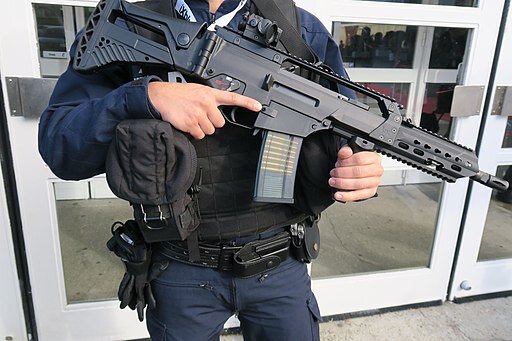Press releases
Recommendations to the new Federal government \ Anchor small arms principles in an Arms Export Control Act!
Germany is one of the world's largest producers and exporters of small arms and light weapons (SALW). In BICC Policy Brief 1\2022, BICC experts make recommendations for a more binding Federal government's small arms policy.

BICC Policy Brief 1\2022 takes a look at the entire product cycle of small arms and light weapons: From production to export licensing, delivery to end users, weapons management and finally the destruction of old stockpiles. The authors give the following policy recommendations:
\ No production of SALW abroad with German technology or German money
The establishment and acquisition of foreign arms companies producing SALW should be prohibited by law for German citizens. The same is true for the export of components and manufacturing technology for SALW to third countries.
\ Make on-the-spot checks a decision-making criterion.
Export licenses for SALW to third countries or non-state actors should be prohibited by law. Any deviations from this should be officially justified. Export licenses for SALW should only be granted, without exception, on the condition that the recipient country accepts on-the-spot checks. Non-compliance with the end-use declaration should lead to a ban on all arms exports to unreliable recipient countries.
\ Develop tracing systems as an additional risk assessment mechanism
Tracing requests can be used by German authorities to investigate the causes of how SALW manufactured in Germany ended up in illegal channels. In future export decisions, these should therefore also be taken into account in the risk assessment.
\ Strengthening the ‘new for old’ principle
On-the-spot checks should also be used to verify whether the recipient country actually complies with the obligation to destroy old weapon stockpiles after new deliveries.
\ Establish a SALW departmental group for coordinated control
The division of responsibilities between state institutions makes a holistic approach to small arms control difficult. A SALW departmental group could correct this situation.
Press release “Empfehlungen an die neue Bundesregierung \ Kleinwaffengrundsätze in einem Rüstungsexportkontrollgesetz verankern!“ (pdf, in German)
\ No production of SALW abroad with German technology or German money
The establishment and acquisition of foreign arms companies producing SALW should be prohibited by law for German citizens. The same is true for the export of components and manufacturing technology for SALW to third countries.
\ Make on-the-spot checks a decision-making criterion.
Export licenses for SALW to third countries or non-state actors should be prohibited by law. Any deviations from this should be officially justified. Export licenses for SALW should only be granted, without exception, on the condition that the recipient country accepts on-the-spot checks. Non-compliance with the end-use declaration should lead to a ban on all arms exports to unreliable recipient countries.
\ Develop tracing systems as an additional risk assessment mechanism
Tracing requests can be used by German authorities to investigate the causes of how SALW manufactured in Germany ended up in illegal channels. In future export decisions, these should therefore also be taken into account in the risk assessment.
\ Strengthening the ‘new for old’ principle
On-the-spot checks should also be used to verify whether the recipient country actually complies with the obligation to destroy old weapon stockpiles after new deliveries.
\ Establish a SALW departmental group for coordinated control
The division of responsibilities between state institutions makes a holistic approach to small arms control difficult. A SALW departmental group could correct this situation.
Press release “Empfehlungen an die neue Bundesregierung \ Kleinwaffengrundsätze in einem Rüstungsexportkontrollgesetz verankern!“ (pdf, in German)


